By Ted Langford, Emily Tracy and Alan Xu
Atlanta is a serious sports town with professional teams in baseball (Braves), football (Falcons), basketball (Hawks and Dream) and soccer (United). It is one of only two cities in the southeastern United States to field professional teams in all four of these major sports (Miami is the other).
While Atlanta teams are usually among the elite each season, there has only been one world championship among the four current teams. The Atlanta Braves won the World Series in 1995. The Hawks have also won an NBA Championship, although it came when the team had yet to move from St. Louis to Atlanta.
College sports are big time as well. Georgia Tech and Georgia State are in downtown Atlanta while the University of Georgia is 75 miles east in Athens. All three compete at the highest level of college athletics throughout the country. Georgia Tech won the national college football championship in 1990. The University of Georgia was crowned the 1980 national college football champion. There are also competitive sports programs at other area colleges and universities including Kennesaw State, Clark Atlanta, Morehouse and Morris Brown.
Sporting Events in Atlanta
Every year Atlanta is the home of championship sporting events. In September, the college football season starts with the Kickoff Classic. Traditionally it’s two games played during Labor Day weekend that usually matches a top team from the Southeastern Conference and a top team from the Atlantic Coast Conference.

(Photo courtesy of Mercedes-Benz Stadium)
In 2017, the games will be played at the newly completed Mercedes Benz Stadium, a state-of-the art entertainment facility with a retractable roof, as well as the soon-to-be home of the Atlanta Falcons and Atlanta United FC. Both games are on national TV and draw attention from fans all over the country.
Atlanta also plays a major role in helping determine the national college football champion. The Chick-fil-A Peach Bowl is one of six bowls that rotate every year to host one of the national semifinal games. In January 2018, Atlanta will host the national championship game at Mercedes Benz Stadium.
In golf, the PGA Tour Championship is played every year at East Lake Golf Club to determine the top professional golfer in the world. In tennis, the BB&T Atlanta Open is played at Atlantic Station as one of the tour stops on the U.S. Open circuit.
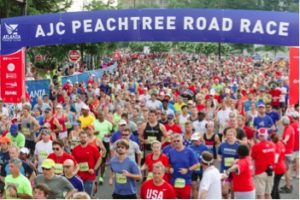
(Photo courtesy of Atlanta Track Tour)
The AJC Peachtree Road Race is the world’s largest 10K (6.2 miles) for professional and amateur runners. Every year on the Fourth of July, more than 50,000 runners, walkers and wheelchair racers make their way down Peachtree Street in the early morning heat and humidity to the cheers of onlookers all along the course. Every participant that finishes earns the coveted Peachtree Road Race T-Shirt as a reward for their efforts. Other top road races in Atlanta include the Publix Marathon and Half Marathon (March). It is held at Centennial Olympic Park and hosted by the Atlanta Track Club.
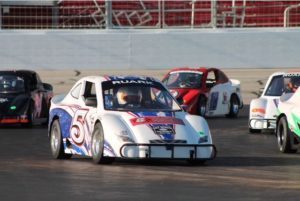
(Photo courtesy of Atlanta Motor Speedway)
If you are into motorsports there are two major race events in the metro area. Atlanta Motor Speedway in Hampton is the home of NASCAR’s Quick Trip 500. The race is usually held in late February or early March on a 1.5-mile oval track and attracts the top drivers in the world including Dale Earnhardt Jr., Jimmy Johnson, Chase Elliot and Kyle Busch.
If you are into motorsports there are two major race events in the metro area. Atlanta Motor Speedway in Hampton is the home of
NASCAR’s Quick Trip 500. The race is usually held in late February or early March on a 1.5-mile oval track and attracts the top drivers in the world including Dale Earnhardt Jr., Jimmy Johnson, Chase Elliot and Kyle Busch.
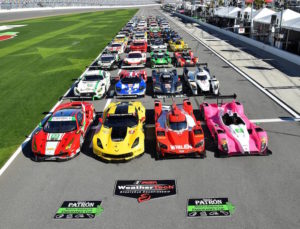
(Photo courtesy of Road Atlanta)
Road Atlanta in Braselton is recognized as one of the world’s best road courses. The multi-purpose sports facility is host to the Motul Petit Le Mans, a sports car endurance race. The race is usually held in October and attracts fans around the world. The course is also used for motorcycle races, racing and driving schools, corporate programs and testing for motorsports teams.
Atlanta is undoubtedly a city with a very rich history in a plethora of different sports, all of which provide great viewership opportunities for locals and travelers alike.
History
The Atlanta Braves played their first regular season game on April 12, 1966, as the first major sports franchise to play a game and call the city their home. They lost the game 3-2 in 13 innings to the Pirates, but it was such a huge moment for the city, the state of Georgia and the South. There was a feeling among those that lived here that Atlanta had arrived as a major market. Atlanta was now in the same league and had the same status as New York, Chicago, Los Angeles and San Francisco. (See related history story here.)
While the Braves did not make the playoffs their first season, they were competitive and had a winning season. The team featured future Hall of Famers Henry Aaron, Eddie Mathews and Joe Torre in the starting lineup. The Braves started the season with Bobby Bragan as the manager. He was fired in the middle of the season and was replaced by Billy Hitchcock.
The Braves played their home games at Atlanta Stadium (later changed to Atlanta-Fulton Co. Stadium). Most of the games were not on TV, but all were broadcast on AM radio. There were many fans who had their radio on the night stand next to their bed and would fall asleep listening to Milo Hamilton, Larry Munson, Ernie Johnson Sr. and Dizzy Dean call the action.
Top Seasons for the Braves
In their third season in Atlanta, the Braves won the West Division title in 1969 and made the playoffs. This was the first season Major League Baseball had divided each league into two divisions. It seemed strange the Braves were placed in the West division along with Los Angeles, San Diego, San Francisco and Houston. Many night games were played on the west coast and didn’t start until 11 p.m. EST, and did not finish until after 2 a.m.
The Braves played and lost to the New York Mets for the National League pennant in a best of five game series. The Mets went on to upset the Baltimore Orioles for the World Series title and were later referred to as the “Miracle Mets” because it was the first season in franchise history they had a winning record.
Through 2016 the Braves have won 17 division titles, two National League pennants and one World Series title. In one stretch between 1991 and 2005 the Braves won 14 division titles.
In 1995 the Braves defeated the Cleveland Indians four games to two games to win the World Series. It was one of the most exciting days in the history of Atlanta. It was the first professional sports title for the city. There was parade in downtown Atlanta with firetrucks carrying the players, the managers and team executives. Tens of thousands of fans lined the streets to catch a glimpse of their favorite players. The Braves top hitters were Chipper Jones, David Justice, Fred McGriff and Javy Lopez. The top pitchers were Greg Maddux, Tom Glavine, John Smoltz and Mark Wohlers. The manager was Bobby Cox.
Top Players for the Atlanta Braves

Hank Aaron, sometimes referred to as “Hammerin Hank”
There have been a lot of great players to wear an Atlanta Braves uniform since the franchise moved here in 1966. The general consensus among Braves fans is Hank Aaron was the greatest Atlanta Braves player of all-time. Aaron, sometimes referred to as “Hammerin Hank,” broke Babe Ruth’s record of 714 home runs in his major league career. On April 8, 1974, Aaron hit his 715 career home run off Los Angeles Dodgers pitcher Al Downing to become the all-time home run leader.
The HR came at Atlanta Stadium before 53,775 fans, the largest crowd to see a baseball game in Atlanta at that time. Aaron would go on to hit 755 home runs before retirig in 1976. In 2007, 31 years later, Barry Bonds of the San Francisco Giants passed Aaron for the most HRs in a career. Bonds finished with 762 home runs.
The Braves established a Hall of Fame of the greatest Braves players. The following Atlanta players have been inducted:
• Hank Aaron
• Eddie Mathews
• Phil Niekro
• Dale Murphy
• Greg Maddux
• Tom Glavine
• John Smoltz
• Chipper Jones
• David Justice
• Ralph Garr
• Javier Lopez
• Andruw Jones
Managers of the Atlanta Braves
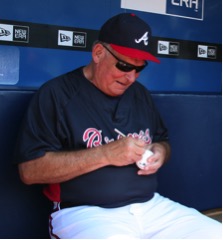
The Braves have had 16 managers since moving to Atlanta in 1966. Bobby Cox was the most successful. He was the manager of the Braves when they won the World Series in 1995. Cox had two stints as Braves manager. The first time was from 1978 to 1981. He was fired and replaced by Joe Torre. The second time was from 1990 to 2010. Cox’s 20-year term is a rare feat among baseball managers. The average tenure of all other Braves managers in the past 50 years has been less than three years.
One of the most memorable events involving an Atlanta Braves manager occurred in 1977. The Braves were having a terrible season and were in the midst of 16-game losing streak. Ted Turner, who owned the Braves after purchasing them in 1976, decided to send current manager Dave Bristol on a 10-day scouting trip and named himself the interim manager. Turner managed the Braves for one game against the Pittsburgh Pirates and lost. It was decided after the game by the National League and the Commissioner that it was not in the best interest of baseball for the owner to manage the team and would not allow Turner back on the field to lead the team. Turner finished his managing career 0-1.
Home Field and Stadium
The Braves opened 2017 at SunTrust Park, a new state-of-the-art baseball stadium located in Cobb County, a suburb northwest of Atlanta. City leaders were disappointed because the new stadium would no longer be in Atlanta and was now outside of their jurisdiction.

Turner Field was purchased by Georgia State University to be converted into the school’s football stadium.
From 1997 to 2016 the Braves played their home games at Turner Field on the south side of Atlanta. The stadium was originally constructed as Centennial Olympic Stadium for the 1996 Summer Olympics in Atlanta. It was converted to a baseball park at the conclusion of the Olympic games. The Braves first home was Atlanta Stadium, later re-named Atlanta-Fulton Co Stadium. They played there from 1966-1996. It was also served as the home of the NFL Atlanta Falcons until 1992, the college football Peach Bowl and the Atlanta Chiefs, a professional soccer team that was located in Atlanta for several years.
The Atlanta Hawks
The Atlanta Hawks are a professional basketball team that competes in the NBA. The team is a part of the league’s Eastern Conference Southeast Division, in which they share the standings with the Washington Wizards, the Miami Heat, the Charlotte Hornets, and the Orlando Magic. Although the franchise has attracted lots of fans (seeing as Atlanta is relatively big on sports), it has struggled to produce consistent results.

Player Kent Bazemore has been with the Hawks since 2014.
The Hawks have won just one NBA Championship in its entire franchise history, and that was back before they even moved to Atlanta. Until recently, in 2015, the team had gone nearly half a century without making it past the second round of playoffs. But in that same season, the Hawks were able to finish with a 60-22 record and win the Southeast Division before eventually losing in the Conference Finals to the Cleveland Cavaliers. Regardless, the team produced its best record yet, giving the fans hope that the team can make the Finals in the near future.
Philips Arena
Ever since the 1999 season, the Atlanta Hawks’ home stadium has been the Philips Arena, located in the center of downtown Centennial Park District. The arena can seat just about 21,000 fans and hosts about 170 events per year. In June of 2017, the Atlanta City Council announced that they would approve the Hawks’ deal to renovate the Philips Arena. The deal outlines a $192.5 million renovation, spread over the course of the 2017 and 2018 offseason periods.
Hawks’ owner Tony Ressler describes the franchise’s intention to make the arena and the area around it “a sports and entertainment destination for residents and visitors alike.” The renovation, which will be the second biggest NBA arena renovation ever (only falling short to Madison Square Garden), will put into place multiple new amenities for Hawks fans, such as: a courtside bar, Top Gulf Suites, a S.W.A.G Shop (who wouldn’t want a haircut while watching the Hawks play?), different social clubs, and of course an overall more aesthetic interior. Perhaps after the renovations are finished, fans will forget the Philips Arena is even a venue for basketball games with so many other things to do.
The St. Louis Era
The history of the Atlanta Hawks only really begins on May 3rd, 1968, when the franchise moved from St. Louis to Atlanta after being sold to Tom Cousins, a real estate developer, and former Georgia governor Carl Sanders. Prior to the unexpected move the Hawks were experiencing their ups and downs elsewhere, sporting the worst record of any team in the West from 1951-1955. Surprisingly, they would then reach as far as the Western Division Finals before losing to the Fort Wayne Pistons in 1956, after moving to St. Louis from Milwaukee after the woeful 1955 season. The move, along with the rising stardom of Bob Pettit (signed in 1955 as a rookie), was a turning point for the franchise.
By 1957, with Pettit finishing second in the league in scoring (24.7 ppg), the Hawks found themselves with a first round bye in the NBA Playoffs. After sweeping the Lakers in the Western Division Finals, earning themselves a spot as the underdog in the NBA Finals, where they would face off against the Boston Celtics. Surprisingly, the Hawks were able to take the series to game 7, where a missed buzzer beater from Pettit would grant the Celtics a 125-123 win in a back and forth series, much to the disappointment of the newer St. Louis fans.
The next year, the Hawks won their first and only NBA Championship, and against who else but the Boston Celtics. In a revenge match in the 1958 NBA Finals, the Hawks were able to win 4-2, with Pettit setting an NBA Playoff scoring record of 50 points in Game 6.
In the years following, the Hawks won the Western Division for three consecutive seasons with strong performances from Pettit, Hagan and Lovellette. In 1960, the fated rematch between the Celtics and the Hawks would come to take place, as they again met in the NBA Finals. Again, the series would go to Game 7, but unlike the 1958 season the Celtics would win it, this time by a margin of 19 points. They again won the Western Division title in 1961, only to lose to the Celtics 4-1 in the Finals. The 1960-61 season would signal the end of a successful period for the Hawks. In the 1961-62 season, the Hawks finished with an overall record of 29-51 and did not make the playoffs for the first time since 1956. Until Pettit’s retirement in 1965, the Hawks would not make it back to the NBA Finals. In 1968, the Hawks once again made it to the Western Division Finals with a strong regular season record, only to be ousted by the Warriors in a 6 game series. And thus ended the St. Louis Hawks, who won one NBA Championship and multiple Western Division Championships.
The Hawks Come to Atlanta
In 1968, the Hawks migrated south to their new home in Atlanta (needless to say, the “Atlanta Hawks” undoubtedly has a better ring to it than the “St. Louis Hawks”). To the surprise of many of the franchise’s new local fans, the Hawks would maintain their spot in the Western Conference despite being located in an Eastern city.
The same fans, however, would be consoled by the team’s somewhat positive performances in the 68-69 and 69-70 seasons, both of which ended with losses to the dominant Lakers in the Western Division Finals. Although the team’s young players Lou Hudson and Pete Maravich were performing well individually (23.2 ppg and 26.8 ppg respectively), the team did not perform well in the next two seasons, prompting a change in management and setting by 1972.
In 1972, the Hawks decided it was time for a big change. The team moved to “The Omni,” its new 16,500-seat stadium, and also lost long-time coach Richie Guerin after more than seven seasons managing the team. They hired new coach Lowell Fitzsimmons, under whose management the Hawks performed strongly in the 1972-73 season, finishing with a 46-36 record.
Unfortunately, the team was knocked out of the playoffs in the first round, courtesy of the Boston Celtics. Even worse, the first year under Fitzsimmons would end up being the best, despite only making it to the first round. The team produced poor results for the next five seasons and Fitzsimmons was released in the middle of the 1976 season, replaced by Hubie Brown. The Hawks’ first season under Brown was unsuccessful, once again eluded by a spot in the playoffs.
1977 was a big year for Atlanta. The Atlanta Braves owner Ted Turner purchased the franchise and simultaneously put down any fears of the team’s relocation away from the city. The team saw Hudson depart as multiple young players were added. For the first time in four seasons, the Hawks earned a spot in the playoffs in 1978. In the 1979-80 season, the Hawks would see their efforts rewarded with its first division title in nearly a decade, although such efforts were not carried into playoffs, where the Hawks would lose in the Eastern Conference Semifinals. The following year, the team once again produced a horrid season, finishing fourth in the division.

Dominique Wilkins (Photo courtesy of mwibbels via Flickr)
In 1982, the Hawks acquired Dominique Wilkins. He brought with him his incredible scoring ability (going on to average 30.7 ppg). His presence on the team would change the franchise, and from 1982-1994, the Hawks were once again among the NBA’s elite teams, for the most part. Wilkins and the team brought home a division title in 1987 with a franchise record season of 57-25.
Again in the 1993-1994 season, the Hawks finished with 57 season wins, tying the franchise record. That same season however, Dominique Wilkins was traded to the LA Clippers. He went on to become the franchise all-time leading scorer. Recently, his statue was erected in front of Philips Arena to commemorate his time spent in Atlanta. From 1994 to 1996, the team, under the management of Lenny Wilkens, was decent. It had no standout, heading-the-NBA, Wilkins-type players, but were able to produce decent records and reach playoffs.
In 1997 the franchise owners decided that it was time for the team to play in a new arena. The Omni was demolished, and the Hawks played their 1998-99 season at Georgia Tech and the Georgia Dome while construction on their new stadium, Philips Arena, was in progress. While it was in construction, however, the Hawks broke the all-time single game attendance record at the Georgia Dome, attracting over 62,000 fans to attend their game against the Chicago Bulls. The year that the Philips Arena opened (1999-2000 season), however, would go on to be the worst season in the Atlanta Hawks’ history. The team finished with a 28-54 record, and Lenny Wilkens also resigned as coach. Lon Kruger would replace him.
Going into the 21st century under the management of Kruger, the team needed to essentially undergo a rebuilding period. Over the next few years, the team looked far better than the 1999-2000 season, although the team’s performance was hindered by injuries and management changes. In 2004, the Hawks made several roster changes, opting for a younger, fresher squad. Although the season ended with a poor record, it was a turning point for the franchise, as young talent was given significant exposure that would only be beneficial going into the future. In 2007, they finally reached postseason play for the first time since before 2000 and by 2008, the team produced a winning record in the regular season. 2012 was another big year for roster changes, with veterans Joe Johnson and Marvin Williams leaving the team. However, the team made playoffs for the sixth consecutive year.
Present Day
The toil continues, as the Hawks look to win their first NBA Championship since moving to Atlanta. And under new GM Travis Schlenk, the franchise is always looking to improve the roster and go ever further in the postseason. It definitely isn’t easy being a Hawks supporter, with questionable drafts, injuries and overall bad luck impeding the success of our historical franchise, but sooner or later, the Hawks will not disappoint, as is the theme with Atlanta’s sports teams.
The Atlanta Dream
The Atlanta Dream is a professional women’s basketball team that plays in the WNBA. The franchise, like the name suggests, is based in Atlanta. Although the team generally plays in Philips Arena, the stadium is unavailable to them between 2017 and 2018 due to conflicting event scheduling. The franchise executives decided upon McCamish Pavilion, a 7,000-seater at Georgia Tech, as the home arena instead. Somewhat unlike the Atlanta Hawks, the Dream has had a more successful history, albeit not as long.
History
The franchise is quickly approaching the 10-year anniversary of its inception, being officially founded in late 2007. Although the team is unaffiliated with its NBA counterpart, one of the original goals of the franchise was to attract larger interest from local basketball fans, many of whom had stopped going to Hawks games due to poor performances.
The very first coach of the franchise was Marynell Meadors, an experienced college basketball coach. The name Dream was chosen by owner Ron Terwilliger, with help from online surveys, in January of 2008. With the team name cemented and the extension draft period over, the Atlanta Dream would go on to participate in the 2008 WNBA Eastern Conference.
The first season was quite forgettable. The team lost their first 17 consecutive games, setting a new WNBA record. Their first victory came against the Chicago Sky, the team that ironically held the record for the longest losing streak previously, in July of 2008. After the offseason, the team saw rapid improvement. With incoming players Angel McCoughtry and Michelle Snow (among others), the Dream reached the playoffs after finishing with a winning record.
In 2010, more improvement showed, as the team made it to the first WNBA Finals in franchise history after winning the Eastern Conference. Although the finals ended in a sweep by the best team in the league, the Seattle Storm, there was plenty of reason to be optimistic as an Atlanta Dream fan.
Modern Era
From then on, the team has brought home two more Conference Championships, in 2011 and 2013, although each time the team failed to win the WNBA Finals. The team has managed a .500 record or better in seven of the nine seasons in its short history, reaching the playoffs in all seven. So far, the Dream has seen three head coaches, Marynell Meadors, Fred Williams, and Michael Cooper (who currently heads the team). Coming off of a somewhat disappointing 2016 season, in which the team finished with a 17-17 record in 4th place in the Conference, the Dream is continuing to foster new talent and build a stronger roster, so that it can bring to Atlanta its first WNBA Championship (hopefully alongside the Hawks. It’s good to be positive, right?).
Atlanta United

Arthur Blank, owner of Atlanta United FC (Photo courtesy of Atlanta United)
Atlanta’s newest professional sport team was announced April 2014 when the Eastern conference of Major League Soccer and now owner Arthur Blank announced they were expanding the franchise and Atlanta was getting a team. Until then, Atlanta was the U.S.’ largest metropolis without a MLS team. Though Atlanta United FC is still in its inaugural season, the team and fan experience has been nothing short of electric.
Mercedes-Benz Stadium and Bobby-Dodd Stadium
Initially, all of the games were expected to be played at the new Mercedes-Benz
Stadium. However, setbacks caused the first half of the season to be held at Georgia Tech’s Bobby-Dodd Stadium. Despite moving from a professional sports arena to a college arena, the fan experience has been well-received by fans and players alike. After the final game at Bobby-Dodd, midfielder Jeff Larentowicz said, “I think it’s been one of the best stretches and most enjoyable for me of my career, honestly.”

The team arriving at Mercedes-Benz Stadium for the first time in August for an open training session (Photo courtesy of Atlanta United)
It was also initially announced that the Mercedes-Benz Stadium would cap the majority of Atlanta United games at 42,500 individuals. Just the home opener and possible MLS playoffs and MLS cup games would seat all 71,000. However, with the crowd popularity, officials are considering opening the stadium to 71,000 for every game.
Record Shattering
In its inaugural season, the team has broken many records and is on track to be one of the most successful expansion teams, in terms of attendance. Atlanta leads the league with an average attendance of more than 46,000 and a total attendance of 147,230, the first team to reach that number in the history of MLS. Every home game has been a sell out. In Atlanta’s inaugural game against New York Red Bulls, 55,297 showed up to support the Five Stripes. On that weekend it stood as the fourth-largest soccer match in the world.
Inaugural Season (So Far)
At a little past the halfway mark in August, Atlanta United holds a 10-8-5 record: 10 wins, 8 losses and 5 draws. Atlanta is seventh in the Eastern Division and has a good chance of making the playoffs. Home games are a different story. At Bobby-Dodd Stadium, Atlanta’s record is 6-2-1.
Top Players
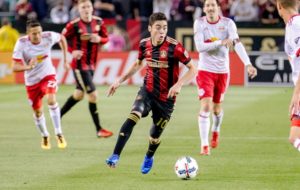
Miguel Almirón (Photo courtesy of Atlanta United)
Miguel Almiron, a Paraguayan 23-year-old midfielder, is often described as the best player on the Atlanta United schedule. Other notable goal scorers include speedsters Josef Martinez and Hector “Tito” Villalba. Eight Atlanta United players were eligible for the prestigious MLS All-Star Game Fan XI: goalkeeper Alec Kann, defender Leandro González Pirez, defender Greg Garza, midfielder Julian Gressel, forward Yamil Asad, forward Tito Villalba and forward Josef Martínez.
Notable Moments
On February 10, 2017, Atlanta United announced that the number 17 would be reserved for the fans, commemorating the year of the team’s first inaugural season in the MLS. Atlanta United aims to recognize that from the very beginning, the fans, the city and the people define the spirit and essence of this club.
Atlanta United showcases four supporter groups on its website: Footie Mob, Terminus Legion, Resurgence and Faction. The supporter section, which is allocated for season fans and houses much of the supporters group, is “the heart beat of the stadium,” according to Atlanta United’s website.
“The Supporter Section is… where the ATL is brought to life by its most passionate fans. Together, we strive to create the loudest, most creative, most passionate and stunning, gritty yet flashy sporting experience in North American soccer.”
Though there are still a few games left this season, season tickets are available for the 2017-2018 season. If it’s like this year, they will sell out early, so we recommend checking out the options sooner rather than later.
